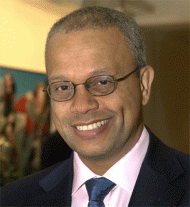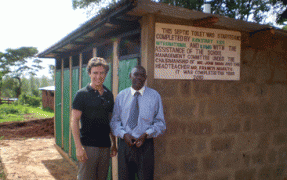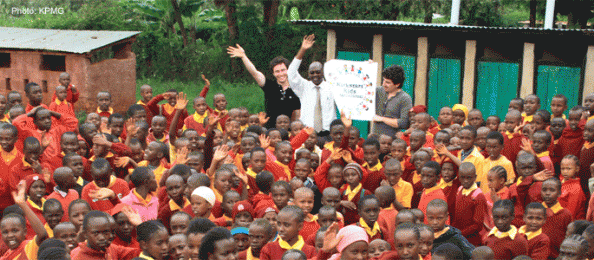Putting our skills to work in pursuit of the MDGs
Our people are getting involved in hundreds of citizenship projects around the world, and our member firms are developing initiatives to suit their local communities and environments. By harnessing the skills we use every day and applying them to the world and communities around us, we can help make positive changes in our communities – locally and across the world.
Citizenship is embedded in the KPMG values and our firms have the scale, influence, professional skills, and business knowledge to make a significant and positive contribution to the issues affecting our communities.
Responsible business practices, which are at the heart of corporate citizenship, help build trust and contribute to development and sustainable markets. In today’s challenging world, business must move beyond good internal governance, compliance, and ethical behavior toward becoming committed actors collaborating with other organizations to tackle global social and environmental issues.
Our strategy and role
KPMG is aligning its global citizenship strategy with the UN Global Compact’s Ten Principles and the Millennium Development Goals (MDGs). The strategy focuses on the following three key components:
- Global themes
- The Global Development Initiative (GDI): Our global response to tackle world poverty
- The Global Green Initiative: Our global response to the challenges of climate change and environmental sustainability
- Global policy issues relating to corporate responsibility: KPMG is a signatory to the UN Global Compact and participates in global policy discussions through the World Economic Forum and other key global multi-stakeholder coalitions
- Leadership action to tackle country and community concerns through member firm programs

“Through the Global Development Initiative we will apply KPMG’s skills, knowledge, and resources to help achieve the Millennium Development Goals, by working with local and international development agencies and institutions to tackle extreme poverty and inequality through building local capacity.”
Lord Hastings of Scarisbrick CBE, Global Head of Citizenship and Diversity, KPMG International
The KPMG Global Development Initiative
The sense of urgency to bring an end to world poverty has never been greater than in these critical last five years leading up to the 2015 MDG target date.
KPMG believes that the private sector is critical in addressing poverty and must work alongside governments and society. KPMG’s Global Development Initiative is an innovative program designed to take our commitment to corporate citizenship to a new global level. It can be defined as “putting our skills to work in pursuit of the MDGs.”
Through the GDI, we use our skills and our resources to become fully involved in finding sustainable solutions to global and local poverty issues, working alongside governments, civil society groups, international agencies, and other private sector organizations. We strive for wide participation from Partners and staff across KPMG member firms and for maximum impact. The GDI aims to:
- put our skills to work in pursuit of MDGs 1, 2, and 3 (those MDGs being most closely aligned with our values, knowledge, and experience);
- develop solutions to bring about systemic change that addresses the root causes of poverty;
- develop solutions that can be replicated and scaled up;
- participate in public-private networks that act against extreme poverty;
- act as a catalyst and advisor for increased action from others.
The positive societal impact of KPMG’s Global Development Initiative has continued to grow throughout the years. KPMG people have contributed to the MDGs both by collaborating with NGOs and UN entities and also by directly assisting those in need.
“People working at KPMG have skills and talent that we, as Save the Children, are really looking for when we try to find new solutions to old problems.”
Jasmine Whitbread, Chief Executive of Save the Children
The positive societal impact of KPMG’s Global Development Initiative has continued to grow throughout the years. KPMG people have contributed to the MDGs both by collaborating with NGOs and UN entities and also by directly assisting those in need.
Following are four examples of collaboration across the continents that give an insight into the wide range of impacts of KPMG’s citizenship work.
The Millennium Cities Initiative
KPMG’s Transaction Services practices have been providing economic and commercial due diligence to support the Millennium Cities Initiatives’ investment reports. The reports on cities in Ethiopia, Ghana, Kenya, Malawi, Nigeria, and Tanzania are being used to encourage investment to lift the local economy.
Member firms in Ghana, India, Japan, Kenya, Malawi, the Netherlands, Nigeria, Russia, Tanzania, and the United Kingdom are engaged with the Millennium Cities Initiative to support the delivery of the reports. KPMG in the United States has also provided a secondee to the Millennium Cities Headquarters.
Steps have been taken for these investor reports to lead to real tangible improvements in the lives of people experiencing poverty. For example, with the assistance of the Initiative in Kumasi in Ghana, the following results have been achieved.
- A viable supplier of palm fruits for a palm oil project has been identified in cooperation with the Millennium Villages Project and investment pledges have been secured.
- Following the production of bamboo bikes at The Earth Institute at Columbia University and a successful pilot program in Kumasi, a Ghanaian investor is expected to commence production of bamboo bikes in Kumasi in June 2010.
- In 2009, the Ghana Investment Promotion Centre opened a regional office in Kumasi to promote the Ashanti region and the city of Kumasi to investors.
- Preparations are under way for an investment promotion training workshop for city officials.
- The Kumasi Metropolitan Authority has committed $100,000 toward the Kumasi Investment Initiative and further fundraising activities are under way.
Familia Moja (One Family)
When James Woodward, a graduate who works for KPMG in Australia, volunteered at an orphanage in a Nairobi slum, he was so moved by the horrific conditions that he committed his professional skills and resources to provide for the children.
James established the Familia Moja Children’s Centre and registered it in Kenya with the help of KPMG’s local office while also establishing Kickstart Kids International as a supporting charity in Australia. With the help of KPMG colleagues, James is chairing the boards of both charities in Australia and Kenya, preparing budgets, implementing financial controls, working with government agencies in both Australia and Kenya, preparing financial accounts for audit, hiring staff, purchasing land, and managing the income-generating projects.
The 29 boys and girls are now attending school (MDGs 1 and 2) and 16 have achieved results placing them in the top ten of their classes. Their nutritional status has improved (MDG 1) and the new premises will soon be carbon-neutral with water collected on site, waste treated on site, and local food production as well as all materials (construction and ongoing) locally sourced (MDG 7).
SIFE
Students of Free Enterprise (SIFE) brings together a diverse network of university students, academic professionals, and industry leaders around the shared mission of creating a better, more sustainable world through the positive power of business. SIFE mobilizes university students to make a difference in their communities while developing their skills to become socially responsible business leaders. More than 30,000 students across 1,500 universities participate in SIFE worldwide.
“SIFE teaches business ethics, market economics, teamwork, and community service, which mirror KPMG’s core values. Its projects provide exciting opportunities for KPMG people to be involved with meaningful economic development work, and SIFE students are the kind of people we look to hire across the globe – questioning, committed, and caring. Our relationship with these amazing SIFE students reminds us of the good that can result from free enterprise.”
Timothy P. Flynn, Chairman of KPMG International
KPMG has supported SIFE since 1996 and has played a pivotal role in helping SIFE go global. Today, KPMG member firms support SIFE in about 30 countries in three main areas.
- Launches – They provide front-end operation support to help set up national SIFE operations and provide introductions to businesses, universities, students, etc.
- Coordination and expansion – They use existing communication networks to help share information, updates, and best practice ideas internally and externally. They host receptions for business communities and present SIFE partnership at internal leadership meetings.
- Timing and resources – They provide finance, venue, and people support for national and regional SIFE operations. KPMG member firm Partners support SIFE by being national, regional, and international judges and sit on various SIFE advisory boards.
Following are three specific examples of member firm involvement.
- The chairman of the KPMG Foundation in India is the vice chairman of SIFE India, and three KPMG employees support the regional coordination for SIFE in Bangalore and Delhi to promote and increase SIFE activities in India. KPMG also provides judges, mentors, and verifiers for the regional activities. In addition, KPMG in India has initiated a KPMG-SIFE Business Ethics grant, which is offered to teams that exhibit a proper understanding of business ethics and have also incorporated a strong ethical element into their projects.
- KPMG in Brazil has been supporting SIFE Brazil for 10 years. The chairman of KPMG in Brazil plays an active role in the new Council Board of SIFE in Brazil. Also, KPMG in Brazil was a main sponsor of the 2008 National Competition; three KPMG Partners and the leader of audits for nongovernmental organizations were judges at the event; and a KPMG audit manager and supporting team member helped to coordinate and audit the processes for credibility.
- Since 2002, KPMG in Nigeria has been providing bookkeeping services, internet access, payroll administration, and sponsoring the logistical aspects of the annual national competition.

KPMG in India’s Partner school program
Our initiatives in education span schools and colleges across India. Through programs such as SIFE and KA India, we provide a platform for school and college students to build upon their understanding of the business environment around them. Both these programs are dynamic tools for our employees to engage actively with the citizens of tomorrow and shape their outlooks.
During the past year, we began our Partner school program, which seeks to strengthen the infrastructure, IT, and teaching inputs in selected schools. We strongly believe that a sound educational framework plays a key role in furthering community development and creating a valuable human resource network.
Partner school program
Expansion of our involvement to the primary and mid-level education sectors was a natural progression of our commitment toward encouraging and fostering academic excellence. This program is in addition to our other education programs, and we hope to make a tangible difference in the lives of children in our communities.
Our current partner schools, both with classes for students from kindergarten to the 10th grade are:
- Literacy India, Delhi
Literacy India started in 1996 with the objective of empowering underprivileged children and women. With a diverse range of programs, Literacy India works with women and children in villages to impart basic education, and also to help them develop skills in performing arts, science, and technology. - St Joseph’s High School, Colaba, Mumbai
St Joseph’s High School, Colaba, was founded in 1929 by the Convent of Jesus and Mary. The school aims at imparting education for the overall development of a child’s personality, and lays emphasis on outdoor activities and physical training.
Hospice Africa
KPMG in Ireland wanted to reach out to people in the developing world living in extreme poverty. When the charity Hospice Africa established a Dublin support office, KPMG Ireland’s CEO therefore made it his responsibility to help them by seconding a director to act as interim CEO, whose job it was to advise and assist the Board for six months in developing the vision, goals, processes, and procedures for the organization. This skills-based support will leverage a cash donation from the Irish firm to fund a new clinical building in Uganda over the next three years, which will be a center of excellence in palliative care. Its benefits will stretch internationally as medical staff will be invited to share learning and best practice to take back to their own countries. In September 2009, KPMG’s work with Hospice Africa won the Chambers Ireland CSR Award for best international project, providing public recognition for the project as a leading example of corporate social responsibility.
This project description was originally presented in the Global Compact International Yearbook 2010.
Lord Michael Hastings of Scarisbrick is KPMG International’s Global Head of Citizenship and Diversity. Previously, he was the BBC’s first head of corporate social responsibility. In January 2003, Michael Hastings was awarded a CBE (Commander of the British Empire) in recognition of his services to crime reduction. In July 2005, he was awarded the honor of an independent cross bench peerage to the House of Lords.
About Us // Privacy Policy // Copyright Information // Legal Disclaimer // Contact
Copyright © 2012-2018 macondo publishing GmbH. All rights reserved.
The CSR Academy is an independent learning platform of the macondo publishing group.









